![Merry Christmas, Mr Lawrence [DVD]](/pictures/1141086.jpg) Merry Christmas, Mr Lawrence | DVD | (29/08/2016)
from £24.99
| Saving you £-12.00 (N/A%)
| RRP
Merry Christmas, Mr Lawrence | DVD | (29/08/2016)
from £24.99
| Saving you £-12.00 (N/A%)
| RRP A highly unusual war movie with as many detractors as fans, this English-language feature directed by Nagisa Oshima (In the Realm of the Senses) stars David Bowie as a silent, ethereal POW in a Japanese camp. Protesting--via his own enigmatic rebellion--the camp's brutal conditions and treatment of prisoners, Bowie's character earns the respect of the camp commandant (Ryuichi Sakamoto). While the two seem locked in an unspoken, spiritual understanding, another prisoner (Tom Conti) engages in a more conventional resistance against a monstrous sergeant (Takeshi). The film has a way of evoking as many questions as certainties and it is not always easy to understand the internal logic of the characters' actions. But that's generally true of Oshima's movies, in which the power of certain relationships is almost hallucinatory in self-referential intensity. The cast is outstanding, and Bowie is particularly fascinating in his alien way. --Tom Keogh
![Merry Christmas Mr. Lawrence [Blu-ray]](/pictures/1151543.jpg) Merry Christmas Mr. Lawrence | Blu Ray | (15/06/2020)
from £15.86
| Saving you £N/A (N/A%)
| RRP
Merry Christmas Mr. Lawrence | Blu Ray | (15/06/2020)
from £15.86
| Saving you £N/A (N/A%)
| RRP David Bowie stars in Nagisa Oshima's 1983 Palme d'Or-nominated portrait of resilience, pride, friendship and obsession among four very different men confined in the stifling jungle heat of a Japanese prisoner-of-war camp in Java during World War II. In 1942, British officer Major Jack Celliers (Bowie) is captured by Japanese soldiers, and after a brutal trial sent, physically debilitated but indomitable in mind, to a POW camp overseen by the zealous Captain Yonoi (Ryuichi Sakamoto). Celliers' stubbornness sees him locked in a battle of wills with the camp's new commandant, a man obsessed with discipline and the glory of Imperial Japan who becomes unnaturally preoccupied with the young Major, while Lieutenant Colonel Lawrence (Tom Conti), the only inmate with a degree of sympathy for Japanese culture and an understanding of the language, attempts to bridge the divide through his friendship with Yonoi's second-in-command, Sergeant Hara (Takeshi Kitano), a man possessing a surprising degree of compassion beneath his cruel façade. Produced by Jeremy Thomas (The Last Emperor, The Sheltering Sky), it was the first English-language film by Oshima (Death by Hanging, In the Realm of the Senses, Gohatto), a leading light of Japanese New Wave cinema, and provided breakthrough big-screen roles for comedian Takeshi Kitano and musician Ryuichi Sakamoto, who also composed the film's hauntingly memorable BAFTA-winning score. This powerful wartime drama was adapted from Laurens van der Post's autobiographical novel The Seed and the Sower' (1963) by screenwriter Paul Mayersberg (The Man Who Fell to Earth). SPECIAL EDITION CONTENTS High Definition Blu-ray⢠(1080p) presentation Original uncompressed stereo audio The Man Who Left His Soul on Film (1983), Paul Joyce's 82-minute documentary profile of Nagisa Oshima The Oshima Gang (1983), a 30-minute documentary following the film's cast and makers at the 1983 Cannes Film Festival Video interviews with producer Jeremy Thomas and actor-composer Ryuichi Sakamoto Exclusive newly filmed interview with critic Tony Rayns Original theatrical trailer Image gallery Reversible sleeve featuring original and newly commissioned artwork by Sam Hadley FIRST PRESSING ONLY: Illustrated collector's booklet featuring new writing on the film by Jasper Sharp
![Cruel Story of Youth (1960) [Masters of Cinema] Dual Format (DVD & Blu-ray)](/pictures/1136897.jpg) Cruel Story of Youth (1960) | Blu Ray | (17/08/2015)
from £N/A
| Saving you £N/A (N/A%)
| RRP
Cruel Story of Youth (1960) | Blu Ray | (17/08/2015)
from £N/A
| Saving you £N/A (N/A%)
| RRP Eureka Entertainment to release Japanese Director Nagisa Oshima’s landmark film CRUEL STORY OF YOUTH a shocking tale of youthful delinquency in post-Hiroshima Japan on Blu-ray for the first time in the UK in a Dual Format edition available from 17 August 2015. This second feature by the Japanese cinema-insurgent Nagisa Ôshima (In the Realm of the Senses Merry Christmas Mr. Lawrence) galvanised its home-turf with its topsy-turvy directorial dexterity and stinging castigation of an indolent self-indulgent youth culture reposing on the eve of the turbulent 1960s. When high-schooler Makoto is saved from the advances of a lecherous middle-aged man by uni student Kiyoshi the pair embark on a fits-and-starts affair that finally settles into a sexually extortionary mutually exploitative dependency that promises to spell their relationship’s doom. Ôshima’s breakthrough portrait of alienated youth comes courtesy of the 2014 Shochiku 4K scan that resurrected the film’s glorious colour palette recently described by critic and programmer James Quandt as “running riot with retro: pulsing neon turquoise telephones hair teased into shellacked grandeur.” The Masters of Cinema Series is proud to present Cruel Story of Youth in a Dual Format edition for the first time on Blu-ray in the UK. Feature: Gorgeous 1080p presentation of the film on Blu-ray from the 2014 4K Shochiku restoration Optional English subtitles New video interview with film critic Tony Rayns Original theatrical trailer 36-page booklet containing an essay interview material and rare archival imagery
![In the Realm of the Senses (1976) (Criterion Collection) UK Only - Original title: Ai no korîda [Blu-ray] [2021]](/pictures/1157442.jpg) In the Realm of the Senses (1976) (Criterion Collection) UK Only - Original title: Ai no korîda | Blu Ray | (03/01/2022)
from £22.98
| Saving you £N/A (N/A%)
| RRP
In the Realm of the Senses (1976) (Criterion Collection) UK Only - Original title: Ai no korîda | Blu Ray | (03/01/2022)
from £22.98
| Saving you £N/A (N/A%)
| RRP Still censored in its own country, In the Realm of the Senses (Ai no corrida), by the always provocative Japanese director Nagisa Oshima, remains one of the most controversial films of all time. A graphic portrayal of insatiable sexual desire, Oshima's film, set in 1936 and based on a true incident, depicts a man and a woman (Tatsuya Fuji and Eiko Matsuda) consumed by a transcendent, destructive love while living in an era of ever escalating imperialism and governmental control. Less a work of pornography than of politics, In the Realm of the Senses is a brave, taboo-breaking milestone. Special Features New, restored high-definition digital transfer (with uncompressed monaural soundtrack on the Blu-ray edition) New audio commentary featuring film critic Tony Rayns New interview with actor Tatsuya Fuji A 1976 interview with director Nagisa Oshima and actors Fuji and Eiko Matsuda, and a 2003 program featuring interviews with consulting producer Hayao Shibata, line producer Koji Wakamatsu, assistant director Yoichi Sai, and film distributor Yoko Asakura Deleted footage U.S. trailer New and improved English subtitle translation PLUS: A booklet featuring a new essay by Japanese film scholar Donald Richie and a reprinted interview with Oshima
![The Realm Of The Senses [1976]](/pictures/1020280.jpg) The Realm Of The Senses | DVD | (21/05/2001)
from £N/A
| Saving you £N/A (N/A%)
| RRP
The Realm Of The Senses | DVD | (21/05/2001)
from £N/A
| Saving you £N/A (N/A%)
| RRP Probably the most famous erotic film ever made, Oshima's masterpiece yields a fascinating conundrum: it's sexually explicit, but is it finally more about the mind than the body.
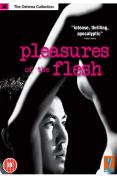 Pleasures Of The Flesh | DVD | (08/09/2008)
from £N/A
| Saving you £N/A (N/A%)
| RRP
Pleasures Of The Flesh | DVD | (08/09/2008)
from £N/A
| Saving you £N/A (N/A%)
| RRP Katsuo Nakamura stars as a man blackmailed by a thief who makes him hold on to some stolen loot while the thief serves a jail sentence. Nakamura is led into temptation by all that money sitting around so he decides to spend it on wild partying and sex before killing himself to avoid retribution.
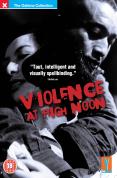 Violence at High Noon | DVD | (28/07/2008)
from £N/A
| Saving you £N/A (N/A%)
| RRP
Violence at High Noon | DVD | (28/07/2008)
from £N/A
| Saving you £N/A (N/A%)
| RRP One of Oshima's most powerful and controversial films. Telling the brutal story of real-life rapist and serial murderer Eisuke (Kei Sato) and his relationship with his protective schoolteacher wife Matsuko (Akiko Koyama) and his only surviving victim Shino (Saeda Kawagushi) Oshima takes the format of the 'real-life crime' drama and uses it as a canvas to lay bare the lost idealism and decay in postwar Japan. Although the action takes place in a seemingly idyllic rural setting Oshima's portrait of humanity is as dark violent and uncompromising as the urban wastes and hellish ghettos of Naked Youth and The Sun's Burial. Never presenting Eisuke as anything less than a monster Oshima goes further to suggest how such deviancy and (specifically male) violence reflects an amoral and corrupt modern society. Part thriller part reaction against the austere Japanese cinematic tradition with avant-garde experimentation and grim social commentary Violence At High Noon is fresh and as fearsome today as when it was first released.
![Merry Christmas Mr Lawrence [1983]](/pictures/1017390.jpg) Merry Christmas Mr Lawrence | DVD | (24/01/2005)
from £33.99
| Saving you £-14.00 (N/A%)
| RRP
Merry Christmas Mr Lawrence | DVD | (24/01/2005)
from £33.99
| Saving you £-14.00 (N/A%)
| RRP 1942: British soldier Jack Celliers (David Bowie) arrives at a Japanese POW camp run by the disciplinarian Yonoi (Ryuichi Sakamoto) who believes the prisoners are cowards because they have chosen to surrender instead of honourably committing seppuku (ritual suicide). When Yonoi meets Celliers he believes he is an evil spirit and a battle of wills begins between the two men.... This is not your average war movie and the performances by Bowie Sakamoto Tom Conti (who plays Mr Lawr
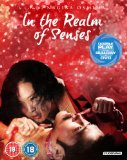 In The Realm of The Senses - Double Play (Blu-ray + DVD) | Blu Ray | (17/10/2011)
from £N/A
| Saving you £N/A (N/A%)
| RRP
In The Realm of The Senses - Double Play (Blu-ray + DVD) | Blu Ray | (17/10/2011)
from £N/A
| Saving you £N/A (N/A%)
| RRP One of the most shocking true stories to hit Japanese society and one of the most controversial films ever made, world renowned director Nagisa Oshima's In The Realm Of The Senses is like no other film you have experienced. Immediately banned on its 1976 release in the United States, given a limited release in the U.K and still censored in its own country, In The Realm Of The Senses is a masterpiece notorious for its graphic sexual content, scandalous subject matter and its unforgettable climax.Set in Pre-War Tokyo, 1936, In The Realm Of The Senses tells the story of Sade Abe. Having found work as a maid in a popular hotel, Sade soon begins a torrid relationship with the infamous owner. Completely infatuated with each other, their increasingly experimental sexual encounters spiral into an all-consuming, obsessive and destructive love affair where even life is worth sacrificing.
 The Sun's Burial | DVD | (26/05/2008)
from £N/A
| Saving you £N/A (N/A%)
| RRP
The Sun's Burial | DVD | (26/05/2008)
from £N/A
| Saving you £N/A (N/A%)
| RRP Set in the post-war slums of Osaka The Sun's Burial follows the lives and fates of the denizens of this hellish ghetto. Pimps prostitutes drug addicts vagrants hustlers and gangsters struggle to survive amidst the poverty and decay of 1950's Japan. Unflinching in it's portrayal of life in these slums the film goes beyond a documentary-style realism to achieve a garish lurid Cinemascope aesthetic that is at once repulsive and yet mesmerising. It's a pitiless and dispassionate portrait of a living hell that lurks behind the facade of a prosperous new Japan a place where everything - food sex even blood - is simply a commodity to be stolen and sold.
![Gohatto [2001]](/pictures/1005871.jpg) Gohatto | DVD | (24/02/2003)
from £N/A
| Saving you £N/A (N/A%)
| RRP
Gohatto | DVD | (24/02/2003)
from £N/A
| Saving you £N/A (N/A%)
| RRP Gohatto is a critcally acclaimed samurai drama set in an all male Shinsengumi samurai school in Japan circa 1865. Young recruit Kano joins the elite fighting force Shinsengumi and realises that he has become the object of desire amongst his fellow comrades. Whilst the samurai adhere to a strict set of rules the senior members of the militia have a growing concern for the consequences of Kano's effect on their samurai...
 Empire of Passion - Double Play (Blu-ray + DVD) | Blu Ray | (17/10/2011)
from £N/A
| Saving you £N/A (N/A%)
| RRP
Empire of Passion - Double Play (Blu-ray + DVD) | Blu Ray | (17/10/2011)
from £N/A
| Saving you £N/A (N/A%)
| RRP In feudal Japan a young soldier begins an intense affair with an older married woman. Driven by passion, obsession and jealousy they decide to violently murder her husband and dispose of the body in a nearby well. Claiming her husband is working away from home the couple carry on their affair in secret. Three years later her husband returns from the dead to haunt the illicit couple, feeding off their guilt and pushing them deeper into the dark realms of insanity.With films such as Merry Christmas Mr Lawrence, Gohatto and the infamous In The Realm Of The Senses, director Nagisa Oshima is one of the most celebrated and controversial figures in Japanese cinema. Made in 1978, Empire Of Passion is an atmospheric, unsettling and unforgettable experience. A huge influence on contemporary Asian horror it has lost none of its beguiling power.
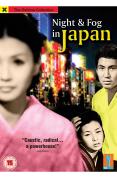 Night And Fog In Japan | DVD | (23/06/2008)
from £6.59
| Saving you £13.40 (203.34%)
| RRP
Night And Fog In Japan | DVD | (23/06/2008)
from £6.59
| Saving you £13.40 (203.34%)
| RRP Nagisa Oshima's most personal film is a reflection by the director on his own disillusionment with the revolutionary student movement of the 1950's and the failure of political radicalism. Taking it's title (as a reference or homage) from Alain Resnais' pivotal 1956 documentary Night and Fog the film has a group of former student revolutionaries who meet again years later at the wedding of one of their classmates. Old feelings rivalaries and grudges gradually erupt to the surface as the one-time friends recall the various treacheries by which their cause was defeated. Cutting between times past and the present and unfolding the action from each of his characters viewpoints Oshima creates an abstract and yet engrossing study of passions past and principles eroded. Controversial upon release - the film's producers pulled the film from distribution after only a few days in cinemas - Night & Fog in Japan retains both its power to shock and its ability to engage the viewer in it's radical form and themes.
 Merry Christmas, Mr Lawrence - Double Play (Blu-ray + DVD) | Blu Ray | (24/10/2011)
from £N/A
| Saving you £N/A (N/A%)
| RRP
Merry Christmas, Mr Lawrence - Double Play (Blu-ray + DVD) | Blu Ray | (24/10/2011)
from £N/A
| Saving you £N/A (N/A%)
| RRP Japanese auteur Nagisa Oshima's (In the Realm of the Senses) BAFTA winning English language dbut, Merry Christmas Mr. Lawrence unites two classic cult figures- rock legend David Bowie (in one of his finest roles) and the inimitable actor/director Takeshi 'Beat' Kitano (Zatoichi). Adapted by Paul Mayersberg (The Man who Fell to Earth) from the novel by Laurens Van der Post, the film is a riveting exploration of racism, brutality and the sparks that fly when cultures collide, concentrating on a war of wills between enigmatic and rebellious POW Jack Celliers (Bowie) and camp commandant Capt Yonoi (Ryuichi Sakamoto, who also contributes the film’s bewitching score). Intelligently exploring the psychology of its characters, Merry Christmas Mr. Lawrence also hints at a sexual attraction between Celliers and Yonoi, and as such is an audacious and original addition to the POW genre. Special Features: The Oshima Gang: 30 Minute Making Of Documentary Exclusive Interviews With Ryuichi Sakamoto and Jeremy Thomas Theatrical Trailer
![Naked Youth [1960]](/pictures/1078415.jpg) Naked Youth | DVD | (25/02/2008)
from £11.48
| Saving you £10.50 (110.64%)
| RRP
Naked Youth | DVD | (25/02/2008)
from £11.48
| Saving you £10.50 (110.64%)
| RRP Oshima's second feature is a shocking tale of youthful delinquency in post Hiroshima japan. Conveying the pent up sexuality and disillusionment among Japan's post war generation it tells the story of teenage lovers Makato and Kiyoshi. She's a good girl gone bad dropping out of school and out of home; he's a violent hoodlum gambler and hustler. Making a living by performing shakedowns and attempting blackmail on unsuspecting middle aged men the film affords a bleak nihilistic take to the 'taiyo-zako' (Japanese cinema's 'delinquent youth' films). Often billed as Japan's Rebel Without A Cause but whereas Jame Dean's Jim Stark had the proverbial heart of gold Kawazu's Kiyoshi is filled only with rage and disgust. All of life's harsh realities await Makoto and Kiyoshi - this is no morality lesson or cautionary tale just a window into a terrible vision of humanity.
![Merry Christmas Mr Lawrence [1983]](/pictures/1020512.jpg) Merry Christmas Mr Lawrence | DVD | (17/07/2000)
from £N/A
| Saving you £N/A (N/A%)
| RRP
Merry Christmas Mr Lawrence | DVD | (17/07/2000)
from £N/A
| Saving you £N/A (N/A%)
| RRP A highly unusual war movie with as many detractors as fans, this first English-language feature directed by Nagisa Oshima (In the Realm of the Senses) stars David Bowie as a silent, ethereal POW in a Japanese camp. In the face of the camp's brutal conditions and treatment of prisoners, Bowie's character earns the respect of the camp commandant (played by Japanese pop star Ryuichi Sakamoto, who also wrote the score) through his own enigmatic rebellion. While the two seem locked in an unspoken, spiritual understanding, another prisoner (Tom Conti) engages in a more conventional resistance against a monstrous sergeant (Takeshi). The film has a way of evoking as many questions as certainties, and it is not always easy to understand the internal logic of the characters' actions. But that's generally true of Oshima's movies, in which the power of certain relationships is almost hallucinatory in self-referential intensity. The cast is outstanding, and Bowie is particularly fascinating in his alien way. --Tom Keogh
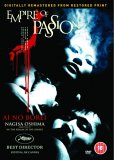 Empire Of Passion | DVD | (25/07/2005)
from £32.37
| Saving you £-12.38 (-61.90%)
| RRP
Empire Of Passion | DVD | (25/07/2005)
from £32.37
| Saving you £-12.38 (-61.90%)
| RRP Very much a companion piece to Nagisa Oshima's classic In The Realm Of The Senses Empire of Passion is part ghost story part love story - a tale of murder guilt and revenge laced with a provocative air of eroticism. Set in rural Japan at the end of the 19th Century the plot is based on the true story of a housewife Seki (Kazuko Yoshiyuki) who embarks on a torrid affair with a younger man Toyoji (Tatsuya Fuji) a soldier recently returned from the war. Following a passionate enc
![Max Mon Amour [1986]](/pictures/1014311.jpg) Max Mon Amour | DVD | (06/09/2004)
from £N/A
| Saving you £N/A (N/A%)
| RRP
Max Mon Amour | DVD | (06/09/2004)
from £N/A
| Saving you £N/A (N/A%)
| RRP When a diplomat's wife takes a chimpanzee as a lover the diplomat has understandably difficulties with the situation. It's true that he has taken various lovers but at least they are of the same species! Before long however the situation starts to take its toll on the husband with some hilarious consequences!
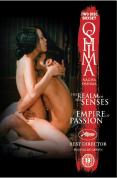 Oshima Boxset - The Realm of the Senses & Empire of Passion | DVD | (02/07/2007)
from £N/A
| Saving you £N/A (N/A%)
| RRP
Oshima Boxset - The Realm of the Senses & Empire of Passion | DVD | (02/07/2007)
from £N/A
| Saving you £N/A (N/A%)
| RRP The Realm of the Senses: Ai No Corrida is perhaps the most notorious erotic film in cinema history having been banned at the 1976 New York Film Festival and denied a video release in the UK until 2000. Based on fact the film depicts the relationship between an ex- prostitute who becomes a domestic servant and her master who have a mutual sexual appetite which is almost boundless. The climax to the film is legendary and has become one of the most talked about scenes in movie history. Empire of Passion: Oshima deservedly won the Best Director award at the 1978 Cannes Film Festival for this thrilling ghost story set in late 19th century rural Japan. A housewife embarks on a torrid affair with a younger man and they decide that they must kill her elderly husband in order to protect their sordid secret. Having committed the murder they dispose of the body and explain his absence to the village by claiming he had departed for Tokyo to find work but three years after his death the ghost of the dead husband starts appearing in the village threatening to expose the illicit passion

Please wait. Loading...
This site uses cookies.
More details in our privacy policy